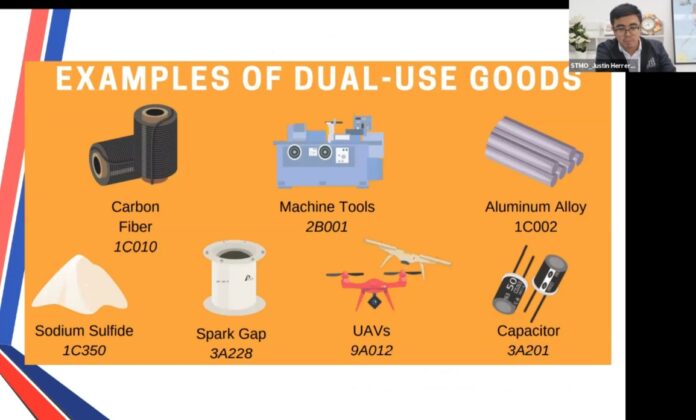
-
Stakeholders, particularly exporters, should start checking if their products are strategic goods that need authorization to export while administrative penalties under the Strategic Trade Management Act (STMA) remain suspended.
-
Companies found violating the STMA can still face criminal liabilities even while administrative penalties are suspended
-
Administrative penalty includes limitation, revocation, or annulment of any authorization and/or registration, as well as fines of up to P250,000
-
The Strategic Trade Management Office can assist companies to determine whether their products are classified as strategic goods under the National Strategic Goods List
To avoid future violations, stakeholders, particularly exporters, should start checking if their products are classified as strategic goods needing authorization to export while administrative penalties are still suspended, advises the Strategic Trade Management Office (STMO).
STMO Policy and Enterprise Relations Division (PERD) supervising specialist Justin Herrera said that once the postponement of administrative penalties under the Strategic Trade Management Act (STMA) is lifted “and your shipment is found to be strategic and you have made no effort in registering or applying for license, then that might be a violation.”
Herrera noted that based on the experiences of other countries implementing a similar law, one of the most common violations against STMA is exporting strategic goods without license or authorization.
He warned that even as administrative penalties are suspended, companies found to be violating the law can still face criminal liabilities.
Under the STMA’s implementing rules and regulations, any person found to have committed violations against the STMA will be imposed with administrative penalty, which includes limitation, revocation, or annulment of any authorization and/or registration. The person will also be fined up to P250,000, or twice the value of the strategic good or related service under the contract, or as assessed by the STMO.
Upon request of the Securities and Exchange Commission, Department of Trade and Industry (DTI), or any other relevant government agencies, STMO can also order the cancellation or suspension of the registration and authorization to operate the partnership, corporation, association, and other juridical entity.
Ways to determine if strategic goods
Herrera, during a recent webinar hosted by PortCalls, said the STMO can assist companies to determine whether their products are classified as strategic goods under the National Strategic Goods List (NSGL).
PERD is also currently sending targeted outreach letters to certain companies whose products might be strategic based on several factors, such as the country of discharge and their Harmonized System codes.
To help companies know whether their products fall under the NSGL, they can also inquire from their counterparts abroad, particularly those in countries already implementing a similar law like the United States and Japan, if their products are considered strategic.
STMA, or Republic Act (RA) No. 10697 (An Act Preventing the Proliferation of Weapons of Mass Destruction [WMD] by Managing the Trade in Strategic Goods, the Provision of Related Service, and for Other Purposes), was signed in 2016 to comply with United Nations (UN) Security Council Resolution No. 1540.
The UN resolution “imposes binding obligations on all states to adopt legislation to prevent the proliferation of nuclear, chemical and biological weapons, and their means of delivery, and establish appropriate domestic controls over related materials to prevent their illicit trafficking.”
Strategic goods are products that, due to security reasons or to international agreements, are considered to be of such military importance that their export is either subject to specific conditions or prohibited altogether. The law also covers the control of transmission of intangibles such as software and technology.
Under the law, traders, transport companies, and logistics service providers moving strategic goods need to be registered and licensed with the STMO.
Recently, STMO also issued Memorandum Circular No. 21-06, which implements the guidelines for financing and brokering under the STMA.
The STMA regulates the export, import, transit and transshipment, re-export and reassignment of strategic goods, software and technology and the provision of related services in order to prevent WMD from proliferating.
STMO is an office under the DTI which serves as the executive and technical agency of the government in establishing the management systems for trade in strategic goods pursuant to STMA.
The law is currently implemented in phases with exports as the first covered sector. Currently ongoing are registration of exporters, processing of authorization applications, and pre-authorization Internal Compliance Program (ICP) audits.
READ: STMO accepts license application to export strategic goods
Registration is required prior to applying for authorization to export strategic goods. The authorization permits only a specific transaction, or a series of transactions, as described in the application and any supporting documents.
The NSGL, meanwhile, is a list of the strategic goods that need authorization and has three annexes: military goods, dual-use goods, and nationally controlled goods.
Military goods refer to goods, software, and technology that are specifically designed, developed, configured, adapted, or modified for military end-use.
Dual-use goods refer to items, software, and technology which are intended for both civil and military end-use, or are used to develop, produce, handle, operate, maintain, store, detect, identify, or disseminate WMD or their means of delivery.
Nationally controlled goods, on the other hand, refer to strategic goods placed under unilateral controls for reasons of national security, foreign policy, antiterrorism, crime control, and public safety.
READ: List of nationally controlled goods in PH requiring authorization released
STMO coverage will gradually extend to other types of shipments, including transit/transhipment, re-export/re-assignment, related services (e.g. transporting, brokering), and imports.
Herrera noted that under their roadmap, imports may be implemented last on 2028. Earlier, STMO said it is focused more on exports than imports, as the latter is already regulated by other government agencies such as the Philippine Drug Enforcement Agency and Philippine National Police-Firearms and Explosives Division. – Roumina Pablo




